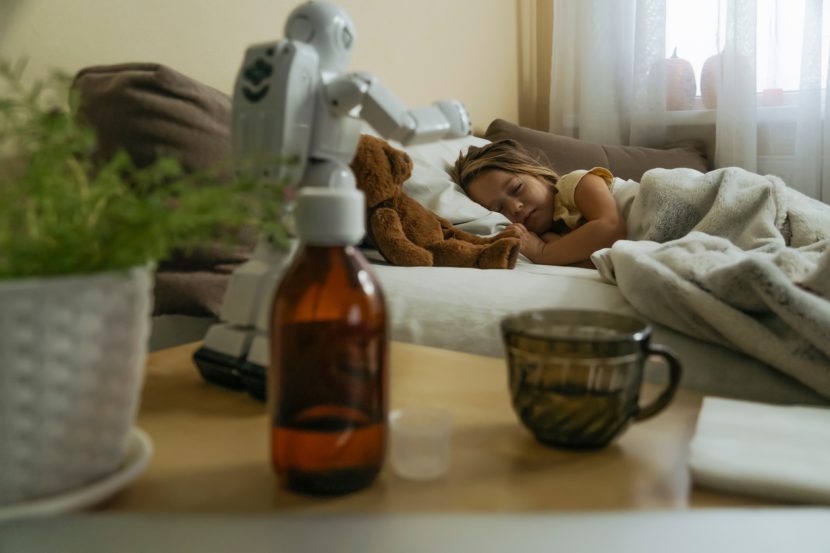In the past two decades, the over-the-counter use of melatonin supplements has seen an unprecedented surge in the United States. Despite its widespread popularity and easy accessibility, concerns persist over parents’ increasing reliance on it as a quick fix for insomnia, with limited evidence supporting its efficacy. The unregulated availability of melatonin, without the need for a prescription, has led to a notable increase in usage, especially among young children and adolescents, sparking heightened worries about potential health risks.
Examining melatonin use in the US
Melatonin is a hormone naturally produced in the brain that regulates the body’s sleep-wake cycle. Its levels rise in the evening with darkness, encouraging sleep and controlling the internal body clock. While the body generates melatonin, interest has grown in using externally produced melatonin, found in supplements that are synthetically created and sold in pill, liquid, or patch forms to manage sleep issues. These supplements may improve sleep in some cases but aren’t suitable for everyone, especially children (Suni E. et al., 2023).
Per the Journal of the American Medical Association (JAMA), over-the-counter melatonin supplement usage has surged by over 500% in the past two decades. Nowadays, one in three American adults falls short of the recommended seven to nine hours of nightly sleep, with about half reporting daytime sleepiness three to seven days a week. Despite its widespread use, melatonin is often misused as an insomnia remedy. However, evidence backing its effectiveness against insomnia remains limited (Upham B, 2022).
In the US, melatonin remains unregulated by the Health Department and federal agencies, setting it apart from regulations in many other countries. Widely accessible online and in stores without a prescription, it’s promoted as a natural and safe sleep aid. However, self-administering high doses over extended periods can lead to serious health conditions, such as depression, high blood pressure, or heart disease (Shaheen M, 2022).
Melatonin use trends in children by US parents
Nowadays, there’s a concerning increase in melatonin use among American children, highlighted by a significant surge in calls to poison helplines from parents regarding melatonin overdose incidents. In 2022, helplines logged 260,435 calls related to children consuming excessive melatonin, representing a 530% rise. Regrettably, this led to two fatalities, five children requiring ventilator support, almost 300 ICU admissions, and over 4,000 hospitalizations (Shaheen M, 2022).
An increasing number of parents are giving their children melatonin as a sleep aid. Research published in JAMA Pediatrics reveals that regular melatonin use among adolescents has become widespread, with about 19% using it. Furthermore, younger children, including approximately 6% of preschoolers aged 1 to 4 and 18% of elementary school kids aged 5 to 9, are also being provided melatonin by their parents as a sleep aid (Searing L, 2023).
The researchers discovered that children’s use of melatonin was not sporadic but rather regular. Preschoolers had been using the supplement for an average of 12 months, elementary schoolchildren for 18 months, and adolescents for 21 months (Searing L, 2023). This heightened usage raises concerns, especially considering that melatonin is now present in children’s favorite snacks like gummy bears, resembling and tasting like candy (Coblentz E, 2023).
Understanding unhealthy parental practices
The demand for melatonin seems to be on the rise. According to SPINS, a technology company supporting the wellness industry, sales of children’s melatonin supplements in retail stores surged by 87% in 2022. Many parents note that their children experience earlier sleep onset and wake up consistently at the same time each morning, resulting in reduced stress linked to parental responsibilities. This shift has enabled parents to concentrate on providing for their families while fostering stronger connections with their partners (Caron C, 2020).

Initially perceived as effective, melatonin often requires escalating doses in children over time to sustain its effectiveness. However, self-administering dosages without consulting a doctor can pose risks (Thompson D, 2023). Indeed, pediatricians claim that higher doses of melatonin don’t typically yield substantial benefits and may result in unwanted side effects like headaches, morning grogginess, or vivid dreams (Caron C, 2020).
Moreover, many parents might lack a comprehensive understanding of the supplements they provide their children. In tandem, scientists are sounding alarms about the potential impact of melatonin on the timing of puberty in developing children (Thompson D, 2023).
Furthermore, earlier studies have shown inconsistencies in melatonin gummies, highlighting differences between the labeled and actual melatonin content (Osborne M, 2023). The highest variability exists in chewable tablets, the form most commonly consumed by children. To further exacerbate the situation, determining the supplement’s other ingredients can be extremely challenging, if not impossible (McCarthy, 2022).
Exploring better solutions for children’s sleep without melatonin
Experts recommend that healthy children under 3 years old should avoid melatonin use, as sleep issues are usually behavioral at this age. For children aged 3 to 5, consulting a pediatrician is advised before considering melatonin use (Coblentz E, 2023). While melatonin might be an option for a limited period, it’s important to investigate whether an underlying issue is contributing to the child’s insomnia (Caron C, 2020).
Pediatricians discourage administering melatonin to children without sleep issues just to improve sleep quality. In cases where melatonin seems suitable for a child experiencing insomnia following a thorough evaluation, it should not be solely relied upon.
It’s crucial to combine melatonin use with behavioral interventions. For instance, using melatonin alone won’t help if a child or teenager uses electronic devices before bedtime, as the light emitted from these devices disrupts the body’s natural release of melatonin (Fliesler N, 2022).
To enhance the effectiveness of natural melatonin in promoting sleep, parents should consider healthier alternatives, such as ensuring exposure to bright light during the day to regulate sleep patterns. Establishing a structured bedtime routine is also vital, especially for children under 6, as sleep issues at this age often stem from behavior. Additionally, aligning a child’s bedtime with their natural sleep tendencies and gradually shifting it earlier can assist in determining their optimal sleep onset time (Caron C, 2020).

At Humanium, we advocate for the healthy and safe development of children, emphasizing their physical, emotional, and social well-being. We believe that every child deserves protection for their health, particularly during the crucial stages of rapid brain development in childhood. Whether through donations, child sponsorship, or volunteering, your contribution greatly empowers us to uphold children’s rights.
Written by Lidija Misic
Bibliography:
Caron Christina (2020), Parents Are Relying on Melatonin to Help Their Kids Sleep. Should They? Retrieved from The New York Times at https://www.nytimes.com/2020/05/18/parenting/melatonin-sleep-kids.html. Accessed on December 30, 2023.
Coblentz Emilee (2023), 1 in 5 children under the age of 14 take melatonin regularly, new study shows. Retrieved from USA Today at https://www.usatoday.com/story/life/health-wellness/2023/11/28/is-melatonin-ok-for-kids-more-americans-using/71732377007/. Accessed on December 30, 2023.
Fliesler Nancy (2022), Melatonin for kids: Is it effective? Is it safe? Retrieved from Boston Children’s Hospital at https://answers.childrenshospital.org/melatonin-for-children/. Accessed on December 30, 2023.
McCarthy Claire (2022), New advice on melatonin use in children. Retrieved from Harvard Health Publishing at https://www.health.harvard.edu/blog/new-advice-on-melatonin-use-in-children-202210062832. Accessed on December 30, 2023.
Osborne Margaret (2023), Melatonin Use Is Rising in U.S. Children, Study Finds. Retrieved from Smithsonian Magazine at https://www.smithsonianmag.com/smart-news/melatonin-use-is-rising-in-us-children-study-finds-180983467/. Accessed on December 30, 2023.
Searing Linda (2023), Nearly 1 in 5 adolescents now using melatonin to sleep, researchers say. Retrieved from The Washington Post at https://www.washingtonpost.com/wellness/2023/11/27/children-adolescents-melatonin-sleep-aid/. Accessed on December 30, 2023.
Shaheen Mansur (2022), Could melatonin give you dementia? Experts warn sleep-aid use in America is ‘out of control’ and taking more than 5mg a night over a sustained period could cause cognitive damage. Retrieved from Daily Mail at https://www.dailymail.co.uk/health/article-11058925/Experts-warn-melatonin-use-America-control.html. Accessed on December 30, 2023.
Suni Eric et al. (2023), Melatonin and Sleep. Retrieved from Sleep Foundation at https://www.sleepfoundation.org/melatonin. Accessed on December 30, 2023.
Thompson Dennis (2023), Melatonin Use Skyrockets Among U.S. Kids, Study Finds. Retrieved from HealthDay at https://www.usnews.com/news/health-news/articles/2023-11-15/melatonin-use-skyrockets-among-u-s-kids-study-finds. Accessed on December 30, 2023.
Upham Becky (2022), Research Shows More Americans Are Trying Melatonin Despite Potential Risks. Retrieved from Everyday Health at https://www.everydayhealth.com/melatonin/research-shows-more-americans-trying-melatonin–despite-potential-risks/. Accessed on December 30, 2023.


